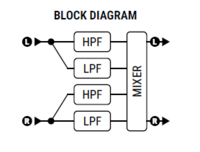This is the wiki for products made by Fractal Audio Systems, maintained by members of the community.
November 2025: the wiki is updated with AM4 data.
Difference between revisions of "Crossover block"
| Line 22: | Line 22: | ||
* [http://en.wikipedia.org/wiki/Audio_crossover Wikipedia: Audio crossover] | * [http://en.wikipedia.org/wiki/Audio_crossover Wikipedia: Audio crossover] | ||
| − | =Crossover block diagram | + | =Crossover block diagram= |
[[image:Crossover block.PNG|200px]] | [[image:Crossover block.PNG|200px]] | ||
| + | |||
=Tips, tricks and troubleshooting= | =Tips, tricks and troubleshooting= | ||
Revision as of 18:40, 3 January 2024
Contents
Available on which products
- Axe-Fx III: 2 blocks
- FM3: no
- FM9: 1 block
- Axe-Fx II: 2 blocks
- FX8: no
- AX8: no
Channels or X/Y
- Axe-Fx III and FM9: 2 channels
- Axe-Fx II: no
What is a crossover
The Crossover block is a simulation of an electronic crossover. A crossover splits the audio signal into frequency ranges, to be processed or amplified separately.
More explanation:
Crossover block diagram
Tips, tricks and troubleshooting
No Global blocks
The Crossover block doesn't support Global blocks.
Bi-amping
Some bass/guitar players split their signal in highs and lows, and send them through different amplifiers. This can be accomplished with the Crossover block. The factory preset PLEXI BI-AMP (Axe-Fx series only) demonstrates this. Or check Leon Todd’s video tutorial: 5 Minute Tones - Distorted Bass
FM3
There's no Crossover block in the FM3. Filters can be used to achieve something similar. Check this FM3 factory preset: POLYFUZZ CROSSOVER
Flint tremolo
This forum thread discusses the use of the Crossover block to create a so-called Flint emulation: The Flint Tremolo Done Right
